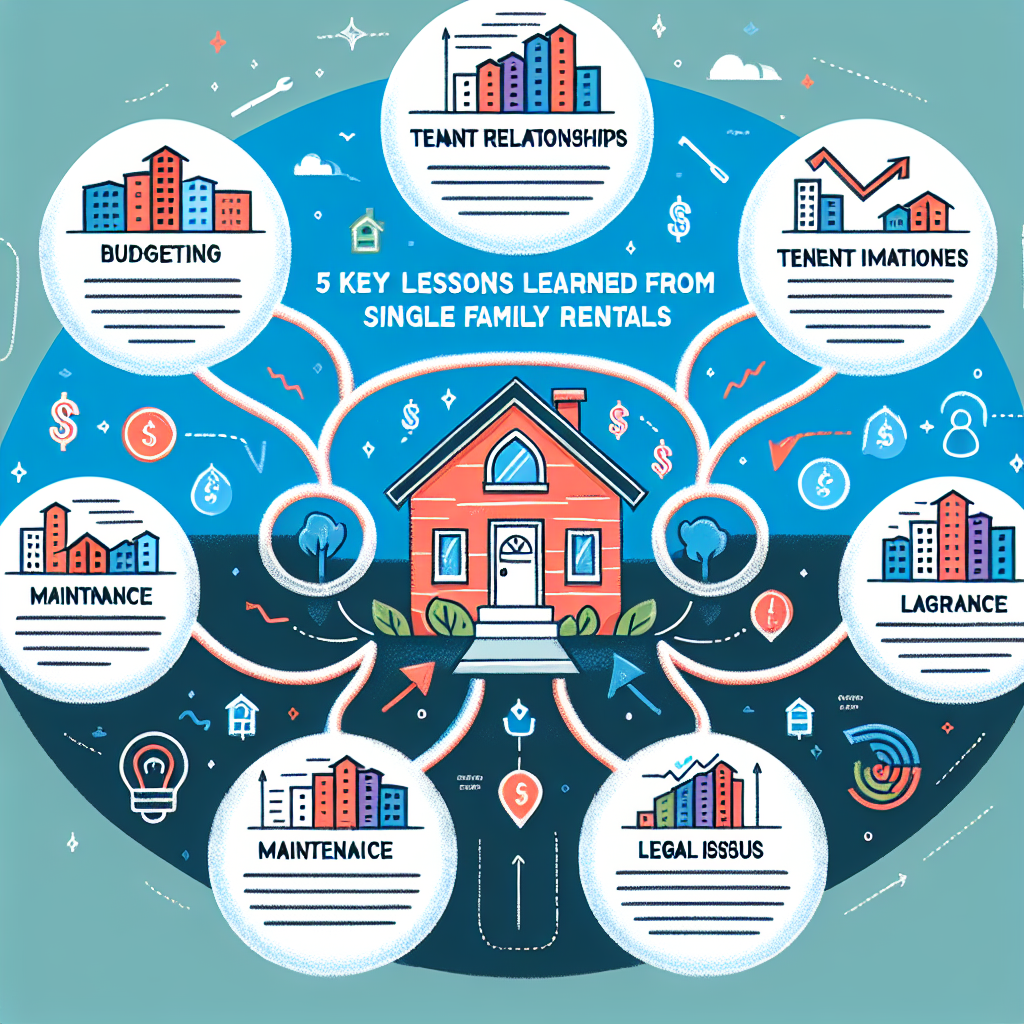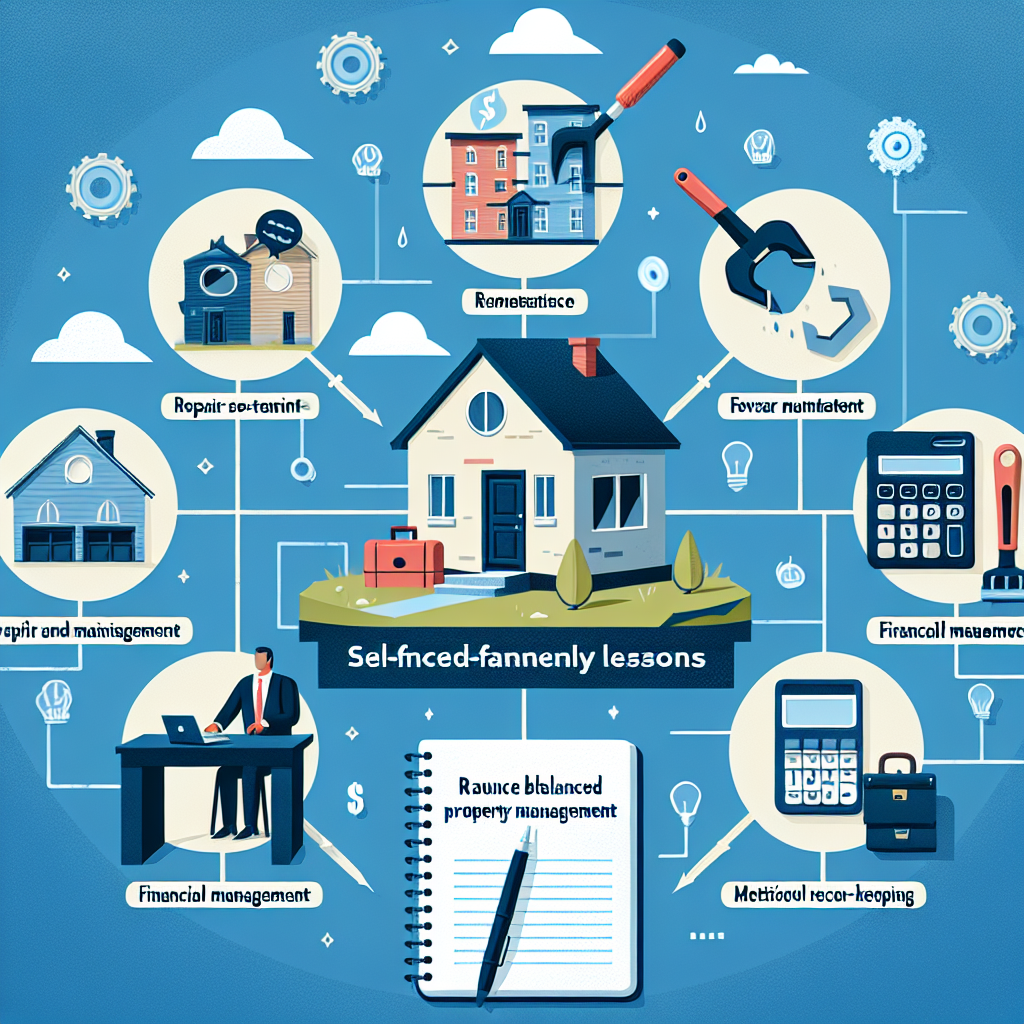-
Table of Contents
- Insights from Self-Managing Single Family Rentals: 5 Key Lessons Learned
- 1. The Importance of Thorough Tenant Screening
- 2. Effective Communication and Relationship Building
- 3. Proactive Property Maintenance
- 4. Financial Management and Record Keeping
- 5. Legal Compliance and Risk Management
- Conclusion
Insights from Self-Managing Single Family Rentals: 5 Key Lessons Learned

Managing single-family rentals can be a rewarding yet challenging endeavor. For those who choose to self-manage their properties, the experience can offer valuable lessons that can significantly impact their success. This article delves into five key lessons learned from self-managing single-family rentals, providing insights that can help both novice and experienced landlords navigate the complexities of property management.
1. The Importance of Thorough Tenant Screening
One of the most critical aspects of managing single-family rentals is tenant screening. A thorough screening process can help landlords avoid problematic tenants and ensure a steady rental income. Here are some key components of an effective tenant screening process:
- Credit Checks: Reviewing a potential tenant’s credit history can provide insights into their financial responsibility and ability to pay rent on time.
- Background Checks: Conducting background checks can help identify any criminal history or past evictions, which can be red flags for potential issues.
- Employment Verification: Verifying a tenant’s employment status and income can ensure they have the financial means to afford the rent.
- References: Contacting previous landlords and personal references can provide additional insights into a tenant’s reliability and behavior.
Case studies have shown that landlords who invest time in thorough tenant screening are more likely to experience fewer issues with late payments, property damage, and evictions. For example, a study by TransUnion found that tenants with higher credit scores were significantly less likely to be evicted or have late payments.
2. Effective Communication and Relationship Building
Building a positive relationship with tenants through effective communication is essential for successful property management. Clear and open communication can help prevent misunderstandings and foster a sense of trust and cooperation. Here are some strategies for effective communication:
- Regular Check-Ins: Schedule regular check-ins with tenants to address any concerns and ensure the property is being maintained properly.
- Prompt Responses: Respond promptly to tenant inquiries and maintenance requests to show that you value their comfort and well-being.
- Clear Lease Agreements: Ensure that lease agreements are clear and comprehensive, outlining all expectations and responsibilities for both parties.
- Conflict Resolution: Address conflicts and issues promptly and professionally to prevent them from escalating.
Research has shown that positive landlord-tenant relationships can lead to longer tenancy durations and fewer vacancies. A survey by Buildium found that 84% of tenants who had a positive relationship with their landlord were likely to renew their lease.
3. Proactive Property Maintenance
Maintaining the property in good condition is crucial for attracting and retaining tenants. Proactive property maintenance can help prevent costly repairs and ensure tenant satisfaction. Here are some best practices for property maintenance:
- Regular Inspections: Conduct regular inspections to identify and address any maintenance issues before they become major problems.
- Seasonal Maintenance: Perform seasonal maintenance tasks, such as cleaning gutters, servicing HVAC systems, and winterizing the property.
- Prompt Repairs: Address maintenance requests promptly to prevent further damage and ensure tenant satisfaction.
- Quality Upgrades: Invest in quality upgrades and renovations to enhance the property’s appeal and value.
Statistics show that proactive maintenance can significantly reduce repair costs and increase property value. According to a study by the National Association of Realtors, well-maintained properties can sell for up to 10% more than those that are poorly maintained.
4. Financial Management and Record Keeping
Effective financial management and record keeping are essential for the success of any rental property. Keeping accurate records and managing finances efficiently can help landlords stay organized and make informed decisions. Here are some key practices for financial management:
- Budgeting: Create a budget that includes all expenses, such as mortgage payments, property taxes, insurance, maintenance, and repairs.
- Rent Collection: Implement a reliable rent collection system to ensure timely payments and reduce the risk of late or missed payments.
- Expense Tracking: Keep detailed records of all expenses related to the property, including receipts and invoices.
- Tax Preparation: Stay informed about tax deductions and credits available to landlords and ensure accurate tax filing.
Case studies have shown that landlords who maintain accurate financial records and manage their finances effectively are more likely to achieve long-term success. For example, a study by the Urban Institute found that landlords who kept detailed financial records were better able to manage cash flow and make informed investment decisions.
5. Legal Compliance and Risk Management
Understanding and complying with legal requirements is crucial for avoiding legal issues and protecting your investment. Landlords must stay informed about local, state, and federal laws that govern rental properties. Here are some key areas of legal compliance and risk management:
- Fair Housing Laws: Ensure compliance with fair housing laws to prevent discrimination and avoid legal disputes.
- Lease Agreements: Use legally compliant lease agreements that clearly outline the terms and conditions of the tenancy.
- Security Deposits: Follow legal guidelines for handling security deposits, including proper documentation and timely returns.
- Eviction Procedures: Understand the legal eviction process and follow it carefully to avoid potential legal issues.
- Insurance: Obtain adequate insurance coverage to protect against property damage, liability, and other risks.
Statistics show that landlords who prioritize legal compliance and risk management are less likely to face legal disputes and financial losses. According to a survey by the National Apartment Association, 75% of landlords who experienced legal issues reported that they could have been avoided with better legal compliance and risk management practices.
Conclusion
Self-managing single-family rentals can be a challenging yet rewarding experience. By learning from the key lessons outlined in this article, landlords can improve their property management practices and achieve greater success. The importance of thorough tenant screening, effective communication, proactive property maintenance, financial management, and legal compliance cannot be overstated. By implementing these best practices, landlords can enhance tenant satisfaction, reduce vacancies, and protect their investments.
In summary, the five key lessons learned from self-managing single-family rentals are:
- The Importance of Thorough Tenant Screening
- Effective Communication and Relationship Building
- Proactive Property Maintenance
- Financial Management and Record Keeping
- Legal Compliance and Risk Management
By applying these insights, landlords can navigate the complexities of property management with confidence and achieve long-term success in their rental property ventures.








